|
|
|
Sort Order |
|
|
|
Items / Page
|
|
|
|
|
|
|
| Srl | Item |
| 1 |
ID:
090910


|
|
|
|
|
| Publication |
2009.
|
| Summary/Abstract |
This piece argues that free migration was a central if implicit part of the liberal social contract and that America's founders were both aware of this and exploited it to legitimate their new state. The piece begins by describing this uniquely American contribution to liberal political thought. It then juxtaposes this contribution against the nature of our own international order, to show just how foreign the American Century has become. The piece closes with a short depiction of what an American Century would look like today-were it true to this early ideal-and comments on its feasibility.
|
|
|
|
|
|
|
|
|
|
|
|
|
|
|
|
| 2 |
ID:
188955


|
|
|
|
|
| Summary/Abstract |
In his seminal book Exit, Voice, and Loyalty, Hirschman suggests that loyal members are less likely to exit when dissatisfied with the performance of the organization. In the context of a political regime, however, we argue that loyalty may actually encourage exit because loyal members are more sensitive to the performance decline of the regime. Using an original survey conducted in Hong Kong, we show that survey respondents with a stronger local identity have greater migration intentions. We also find that the heterogeneity of perceived political changes plays a significant role as a mediator. We discuss the political implications for Hong Kong.
|
|
|
|
|
|
|
|
|
|
|
|
|
|
|
|
| 3 |
ID:
094223
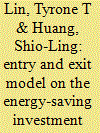

|
|
|
|
|
| Publication |
2010.
|
| Summary/Abstract |
This paper presents an improved decision model based on the real options approach presented by for the firms that have not yet established energy-saving equipment under the entry and exit strategies. Furthermore, the proposed model takes account of the inevitable equipment renewal and the occurrence of unexpected events under the Poisson jump process. The timing for terminating an investment when continuous operations of that business are unprofitable is also explored to realize the optimal timing of implementing the energy-saving strategy. The future discounted benefit B follows the geometric Brownian motion with the Poisson jump process and the replacement of investment equipment. A numerical analysis is followed by a sensitivity study of various parameters to better realize their impacts on the entry and exit thresholds. The results show that for the jump case, the higher probability of occurrence of unfavorable events will result in a higher entry threshold and lower exit threshold. Investors are forced to request higher benefit thresholds to cover the higher probability of losses brought by unfavorable events.
|
|
|
|
|
|
|
|
|
|
|
|
|
|
|
|
| 4 |
ID:
145076
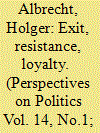

|
|
|
|
|
| Summary/Abstract |
A few years into the most recent wave of popular uprisings—the Arab Spring—studying regime trajectories in countries such as Syria, Egypt, and Yemen still seems like shooting at a moving target. Yet what has not escaped notice is the central role military actors have played during these uprisings. We describe how soldiers have three options when ordered to suppress mass unrest. They may exit the regime by remaining in the barracks or going into exile, resist by fighting for the challenger or initiating a coup d’état, or remain loyal and use force to defend the regime. We argue that existing accounts of civil-military relations are ill equipped to explain the diverse patterns in exit, resistance, and loyalty during unrest because they often ignore the effects of military hierarchy. Disaggregating the military and parsing the interests and constraints of different agents in that apparatus is crucial for explaining military cohesion during such crises. Drawing on extensive fieldwork we apply our principal-agent framework to explain varying degrees and types of military cohesion in three Arab Spring cases: Bahrain, Yemen, and Syria. Studying military hierarchy elucidates decision-making within authoritarian regimes amid mass mobilization and allows us to better explain regime re-stabilization, civil war onset, or swift regime change in the wake of domestic unrest.
|
|
|
|
|
|
|
|
|
|
|
|
|
|
|
|
| 5 |
ID:
170474
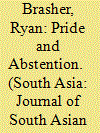

|
|
|
|
|
| Summary/Abstract |
Little research has been done on political dynamics within the Christian community in Pakistan itself, a lacuna I begin to address through survey research among Christian and Muslim students in Lahore. I ground this study in a detailed discussion of the existing literature on Pakistan, and comparative political research on national attachment of minorities elsewhere. I am particularly interested in assessing to what extent Christian students in Lahore have a strong sense of belonging and connection to the national community or feel marginalised from it. In fact, I find that Christians do have a strong sense of connection to their Pakistani identity, but are more inclined toward military rule and less interested in and knowledgeable about politics than their Muslim counterparts. Intra-Christian differences based on income level and denomination are apparent as well: Christian students from wealthier backgrounds have higher levels of political interest and knowledge, whereas poorer students and those affiliated with Pentecostal denominations have less political engagement but higher levels of nationalism.
|
|
|
|
|
|
|
|
|
|
|
|
|
|
|
|
| 6 |
ID:
172308
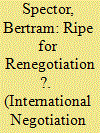

|
|
|
|
|
| Summary/Abstract |
An international negotiated agreement is typically viewed as a major achievement, but it may not last forever. Sometimes agreements need to be adjusted – still based on the existing formulas – as a result of changed circumstances or because particular provisions prove not as effective as originally hoped. But other times, agreements need to be overhauled from scratch and renegotiated using new formulas and possibly involving new actors. Such renegotiations are an under-examined process in the negotiation literature. When and why are renegotiations called for, and what are the best tactics and strategies to ensure that they succeed for the mutual benefit of all stakeholders? This article presents basic research questions that need to be addressed.
|
|
|
|
|
|
|
|
|
|
|
|
|
|
|
|
| 7 |
ID:
093856
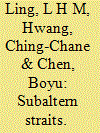

|
|
|
|
|
| Publication |
2010.
|
| Summary/Abstract |
Mainstream approaches perpetuate the Taiwan-China 'crisis'. They do so by following Cold-War concepts and prescriptions, despite the rise of new realities and new visions for cross-strait relations. We draw on Hirschman's identification of 'loyalty' and 'voice' to describe the mainstream discourse on cross-strait relations in Taiwan, mostly directed by the United States. But a third option is now emerging. It offers the possibility of a paradigmatic breakthrough or 'exit' based on articulations of a postcolonial subjectivity for Taiwan and its relations with China.
|
|
|
|
|
|
|
|
|
|
|
|
|
|
|
|
| 8 |
ID:
164991
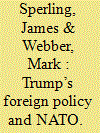

|
|
|
|
|
| Summary/Abstract |
Donald Trump assumed office in January 2017, committed to revamping US foreign policy and putting ‘America First’. The clear implication was that long-held international commitments would be sidelined where, in Trump’s view, the American interest was not being served. NATO, in the crosshairs of this approach, has managed to ride out much of the criticism Trump has levelled against it. Written off as ‘obsolete’ by the American president, it has fared better in the Trump era than many commentators had predicted. NATO exemplifies a tendency in US foreign policy, which pre-dates Trump, where open criticism stops short of abandonment. This pattern has continued since 2017 and indicates a preference for voice over exit. As such, it suggests that Trump’s foreign policy is not always as illogical as many have assumed. Logic is borne of institutional context: Trump has chosen to articulate voice where institutionalisation makes exit unviable. Institutional resilience in general and NATO’s case specifically has a wider relevance, both for transatlantic relations and international order.
|
|
|
|
|
|
|
|
|
|
|
|
|
|
|
|
| 9 |
ID:
153319
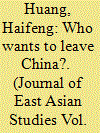

|
|
|
|
|
| Summary/Abstract |
Why are Chinese people moving abroad in unprecedented numbers? Using unique experimental and survey data, this research finds that Chinese citizens with more positive perceptions and, especially, overestimation of foreign socioeconomic conditions are more interested in going abroad. Moreover, correcting socioeconomic overestimation of foreign countries reduces their interest in leaving China, indicating that there is a causal effect from rosier perceptions of foreign conditions to higher interest in going abroad, and emigration does not always represent well-informed “voting with the feet.” The relationship between international political knowledge and exit intentions, on the other hand, is not significant or consistent, suggesting that Chinese citizens’ interest in going abroad is more socioeconomic than political in nature. These results contribute to the study of citizen misinformation, challenge a prevalent assumption in the international migration literature, and help us understand one of the most important social trends in the world's largest developing and authoritarian country.
|
|
|
|
|
|
|
|
|
|
|
|
|
|
|
|
|
|
|
|
|